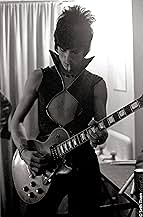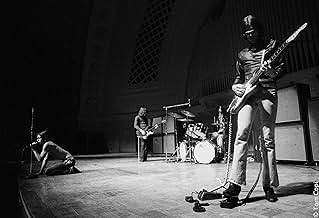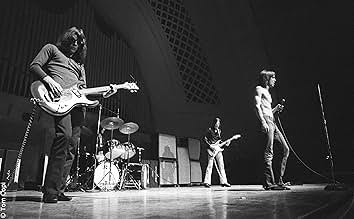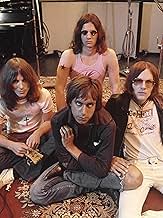NOTE IMDb
7,2/10
6,8 k
MA NOTE
Un regard en profondeur sur le légendaire groupe punk The Stooges.Un regard en profondeur sur le légendaire groupe punk The Stooges.Un regard en profondeur sur le légendaire groupe punk The Stooges.
- Réalisation
- Scénario
- Casting principal
- Récompenses
- 1 victoire et 4 nominations au total
Jim Jarmusch
- Self
- (voix)
Bob Waller
- Self
- (images d'archives)
The Stooges
- Themselves
- (images d'archives)
Ron Asheton
- Self
- (images d'archives)
Harry Partch
- Self
- (images d'archives)
MC5
- Themselves
- (images d'archives)
John Sinclair
- Self
- (images d'archives)
David Bowie
- Self
- (images d'archives)
The Damned
- Themselves
- (images d'archives)
Sonic Youth
- Themselves
- (images d'archives)
Avis à la une
If you're expecting another quirky, brooding Jim Jarmusch film, or even that Jarmusch signature here and there, you will be disappointed. Gimme Danger is still a great film, but Jarmusch doesn't do what he usually does - show that the conventional can be really far out if you excavate a little - because he gets that Iggy and the Stooges are already supremely avante-garde; they are already Jim Jarmuschy. So Jarmusch does the opposite - he brings that down to earth, and just showcases what's already naturally there rather than try to create something. Still, documentary filmmaking turns out to be well suited for at least a couple of Jarmusch creative sensibilities. There's a charming, amiable leading man (Iggy), and when Iggy speaks there's a subtly comedic element, and subtle comedy is essential in all Jarmusch films. When Iggy tells the story of contacting Moe Howard of The Three Stooges, there's no need for direction with a magic touch. Just let it be.
Ultimately, Jarmusch forgoes being a director with a Jarmusch vision in Gimme Danger other than maybe hoping to convince the viewer to believe, after watching this film, that Iggy and the Stooges are the greatest rock and roll band of all time. He made Gimme Danger as a fan more than as Jim Jarmusch the auteur director, and it ends up being a "normal" kind of rock and roll doc/tribute, with plenty of great music and great footage, history, and lots of interviewing.
So to repeat, don't expect Gimme Danger to be a typical Jim Jarmusch film. But if you expect it to be a loving and intelligent tribute to a rock and roll band that "reinvented music as we know it" according to their former manager, a band that wiped out the 60s according to Iggy, you won't be disappointed.
Ultimately, Jarmusch forgoes being a director with a Jarmusch vision in Gimme Danger other than maybe hoping to convince the viewer to believe, after watching this film, that Iggy and the Stooges are the greatest rock and roll band of all time. He made Gimme Danger as a fan more than as Jim Jarmusch the auteur director, and it ends up being a "normal" kind of rock and roll doc/tribute, with plenty of great music and great footage, history, and lots of interviewing.
So to repeat, don't expect Gimme Danger to be a typical Jim Jarmusch film. But if you expect it to be a loving and intelligent tribute to a rock and roll band that "reinvented music as we know it" according to their former manager, a band that wiped out the 60s according to Iggy, you won't be disappointed.
A friend of my recommended this documentary to me. Just randomly heard about it and was enough of a Jim Jarmusch fan to want to try it out, and he loved it, despite not being a fan of the Stooges, or having it change his mind about their music. As much as it was an in-depth look on Iggy Pop and the Stooges, it's just as much an in-depth look on Rock and Roll, and every Rock and Roll Documentary should be.
I gave it a shoot, as I am a fan of the Stooges and what they have done. After all, I'm sure a lot of the music I listen to they directly or indirectly are responsible for.
Going into the movie, I was expecting somewhat an adaption of the book Please Kill Me, which was an in-depth look at protopunk, which I herd the Stooges be described as before, plus they take up a big chuck of the book, but that's not what this doc is at all. It was so focus on the Stooges that it rarely expanded outside of the band members and those really close to them.
As the only original surviving member at the time of this release, Iggy does a lot of the talking, but not in an egotistical way. He seemed very genuine in his stories about The Stooges and their history. Not that the other Stooges did not get to chime as it looks like Jarmusch had been working on this for a while with the drummer of the Stooges also able to tell his stories before his death.
It is all about rock and roll and all about the music. I can see why Jarmusch selected and loves this band as they seem uncompromising to their love of the music. It's a great message on sticking with it. It also a great message about how it never dies within you, as the doc tells the story of the Stooges second guitarist James Williamson, who rolled with the band and Iggy until they dissolved got himself a pretty square life, but when Iggy calls to say come Jam with the band like 40 years later, he did just that.
Not Just for those people who love the Stooges, it's for those who love a really good rock and roll story. This is one!
I gave it a shoot, as I am a fan of the Stooges and what they have done. After all, I'm sure a lot of the music I listen to they directly or indirectly are responsible for.
Going into the movie, I was expecting somewhat an adaption of the book Please Kill Me, which was an in-depth look at protopunk, which I herd the Stooges be described as before, plus they take up a big chuck of the book, but that's not what this doc is at all. It was so focus on the Stooges that it rarely expanded outside of the band members and those really close to them.
As the only original surviving member at the time of this release, Iggy does a lot of the talking, but not in an egotistical way. He seemed very genuine in his stories about The Stooges and their history. Not that the other Stooges did not get to chime as it looks like Jarmusch had been working on this for a while with the drummer of the Stooges also able to tell his stories before his death.
It is all about rock and roll and all about the music. I can see why Jarmusch selected and loves this band as they seem uncompromising to their love of the music. It's a great message on sticking with it. It also a great message about how it never dies within you, as the doc tells the story of the Stooges second guitarist James Williamson, who rolled with the band and Iggy until they dissolved got himself a pretty square life, but when Iggy calls to say come Jam with the band like 40 years later, he did just that.
Not Just for those people who love the Stooges, it's for those who love a really good rock and roll story. This is one!
Early in the film, Iggy mentions how Soupy Sales taught him to keep his writing concise and to-the-point (the kid-show host instructed that letters sent by viewers be twenty-five words or less). The lesson is not lost on Jim Jarmusch, who promises a documentary about the career of the Stooges and delivers exactly that. We get a recap of how they came together, followed by a solid recounting of their brief moment in the spotlight. When they fall apart in '73, the story stops abruptly, then jumps ahead to the group's revival in 2003 (with just a couple of words about what the Ashetons and James Williamson did in the interim). Iggy's solo career is almost completely unmentioned; fitting, as this is a Stooges doc, not an Iggy bio. Though he does get the lion's share of screen time, his recollections here are centered on the band, not himself.
Likewise, the interviews are limited to participants: the band members (minus original bassist David Alexander, who died in '75); manager Danny Fields; the Asheton brothers' sister Kathy; occasional sax sideman Steve Mackay; and late-period bassist Mike Watt. Ron Asheton passed in 2009 and appears via archival interviews. Blessedly, there are no rock critics, musicians or movie stars to expound in an overly fawning, sycophantic fashion about the group's importance to them, rock music, or the development of western civilization in general. The recent Beatles tour documentary "Eight Days a Week" was very nearly sunk by the inclusion of Whoopi Goldberg telling us how her mother bought her a ticket to the Shea Stadium show. Her memories and opinions are no more important (or even germane) than those of the other 60,000 people who were there that night. She's a celeb talking head who added nothing but her ego to the proceedings. Here, the laser focus is on telling a story through those who were part of the story, to the exclusion of third-party opinions (and you know what opinions are like - everybody has one...)
An immense amount of audio and visual material is packed into the hour-and-three-quarter running time, as attested to by acknowledgments in the end credits. That it never seems overstuffed, hyperactive or rushed is a tribute to Jarmusch's sense of pacing.
I went in with limited expectations of a run-of-the-mill rock bio, at best (the choice of film was made by my wife, who's a major Iggy fan). I came out more than impressed by a well-constructed, tightly focused exercise in documentary filmmaking that would have been outstanding no matter the subject.
Likewise, the interviews are limited to participants: the band members (minus original bassist David Alexander, who died in '75); manager Danny Fields; the Asheton brothers' sister Kathy; occasional sax sideman Steve Mackay; and late-period bassist Mike Watt. Ron Asheton passed in 2009 and appears via archival interviews. Blessedly, there are no rock critics, musicians or movie stars to expound in an overly fawning, sycophantic fashion about the group's importance to them, rock music, or the development of western civilization in general. The recent Beatles tour documentary "Eight Days a Week" was very nearly sunk by the inclusion of Whoopi Goldberg telling us how her mother bought her a ticket to the Shea Stadium show. Her memories and opinions are no more important (or even germane) than those of the other 60,000 people who were there that night. She's a celeb talking head who added nothing but her ego to the proceedings. Here, the laser focus is on telling a story through those who were part of the story, to the exclusion of third-party opinions (and you know what opinions are like - everybody has one...)
An immense amount of audio and visual material is packed into the hour-and-three-quarter running time, as attested to by acknowledgments in the end credits. That it never seems overstuffed, hyperactive or rushed is a tribute to Jarmusch's sense of pacing.
I went in with limited expectations of a run-of-the-mill rock bio, at best (the choice of film was made by my wife, who's a major Iggy fan). I came out more than impressed by a well-constructed, tightly focused exercise in documentary filmmaking that would have been outstanding no matter the subject.
Having read (re-read actually) 'Please Kill Me", and having read a lot about Iggy Pop and the Stooges over the years, I didn't expect I'd maybe learn too much about them from this doc. Little did I know not only I would, but that I would be laughing much of the way (the story where Ron Asheton asks Moe Howard's permission to use the name 'Stoooges' kills, but not as much as Iggy's dead serious response when he is told he *willl* play Peter Pan on Broadway by David Bowie's seemingly scummy manager).
It's also at times dark, at times harrowing, and the most welcome thing to me is how Jarmusch starts with the Stooges at their (first) end in 1973, when they were broke, Iggy was missing gigs and often showing up so wasted on heroin he could "sometimes sing, sometimes not", and it changes up how we usually see these kind of rock documentaries. It often will start with the adulatory remarks. Here, Iggy Pop in the 1973 footage looks like he's about ready to puke all over himself... while stage diving... while probably slathering himself with some substance of unknown origin... maybe genitals out too, who knows(!)
This was an entirely fearless band, and they created art simply by virtue of only doing what *they* liked. F*** popular taste. Hell, if one follows Pop by his word (and how can you not?) there were many, many manufactured acts (Including CSNY? please not them) and that if nothing else the Stooges acted as a counterpoint to so much of what was going on in the late 60's and early 70's while being one of the hardest bands of the era. Jarmusch does an excellent job of showing us through Pop, the late Scott Asheton and other interviews, plus plenty of stock footage and, not unlike Julien Temple with Filth & the Fury, clips from old shows, movies and other rock acts (Soupy Sayles being one of them of course) that make joke of what we're seeing, or at least reference.
Even as someone who thought he knew the Stooges, or at least Iggy Pop (real name Jim Osterberg), this gives as full a picture as you can get while, at the very end, showing us just how massive an influence they had. Think about it: they couldn't play (at first anyway, they got better as they went), and yet they changed things simply by the force of what rock and roll could do and has done when it's at its most pure. The film reflects the aggression, the commitment to absurdity, and Pop's own madness in performance, which was an act depending on the night (or it was all of a piece).
FUN! And I never thought I'd see (or think about) the day when a Jim Jarmusch movie had animated sequences. Bonus!
It's also at times dark, at times harrowing, and the most welcome thing to me is how Jarmusch starts with the Stooges at their (first) end in 1973, when they were broke, Iggy was missing gigs and often showing up so wasted on heroin he could "sometimes sing, sometimes not", and it changes up how we usually see these kind of rock documentaries. It often will start with the adulatory remarks. Here, Iggy Pop in the 1973 footage looks like he's about ready to puke all over himself... while stage diving... while probably slathering himself with some substance of unknown origin... maybe genitals out too, who knows(!)
This was an entirely fearless band, and they created art simply by virtue of only doing what *they* liked. F*** popular taste. Hell, if one follows Pop by his word (and how can you not?) there were many, many manufactured acts (Including CSNY? please not them) and that if nothing else the Stooges acted as a counterpoint to so much of what was going on in the late 60's and early 70's while being one of the hardest bands of the era. Jarmusch does an excellent job of showing us through Pop, the late Scott Asheton and other interviews, plus plenty of stock footage and, not unlike Julien Temple with Filth & the Fury, clips from old shows, movies and other rock acts (Soupy Sayles being one of them of course) that make joke of what we're seeing, or at least reference.
Even as someone who thought he knew the Stooges, or at least Iggy Pop (real name Jim Osterberg), this gives as full a picture as you can get while, at the very end, showing us just how massive an influence they had. Think about it: they couldn't play (at first anyway, they got better as they went), and yet they changed things simply by the force of what rock and roll could do and has done when it's at its most pure. The film reflects the aggression, the commitment to absurdity, and Pop's own madness in performance, which was an act depending on the night (or it was all of a piece).
FUN! And I never thought I'd see (or think about) the day when a Jim Jarmusch movie had animated sequences. Bonus!
A look at the Stooges career from their first albums to eventual reunion years later with interviews from the surviving members and lots to hear from Iggy Pop.
I expected more from this documentary I guess because I was a little let down. Yeah it had talking heads and archival footage but not that much of it really. It also spent most of the time talking to Iggy, which makes sense since most of the others are dead, but it gives you only one view. I guess because the band had so short a career there wasn't much to work with, but for a legendary crew, this felt too shallow. But it's not terrible or anything, so fans will eat it up.
I expected more from this documentary I guess because I was a little let down. Yeah it had talking heads and archival footage but not that much of it really. It also spent most of the time talking to Iggy, which makes sense since most of the others are dead, but it gives you only one view. I guess because the band had so short a career there wasn't much to work with, but for a legendary crew, this felt too shallow. But it's not terrible or anything, so fans will eat it up.
Le saviez-vous
- AnecdotesIggy Pop also plays himself in another Jim Jarmusch movie, Coffee and Cigarettes. And also Dead Man (1995).
- ConnexionsFeatures L'Enfer (1911)
- Bandes originalesAsthma Attack
Written by Iggy Pop (James Osterberg Jr.), Ron Asheton (as Ronald Asheton), Scott Asheton, David Alexander
Performed by The Stooges
Courtesy of Elektra Entertainment Group
By arrangement with Warner Music Group Film & TV Licensing
Meilleurs choix
Connectez-vous pour évaluer et suivre la liste de favoris afin de recevoir des recommandations personnalisées
- How long is Gimme Danger?Alimenté par Alexa
Détails
- Date de sortie
- Pays d’origine
- Sites officiels
- Langue
- Aussi connu sous le nom de
- Gimme Danger: La historia de the Stooges
- Sociétés de production
- Voir plus de crédits d'entreprise sur IMDbPro
Box-office
- Montant brut aux États-Unis et au Canada
- 440 627 $US
- Week-end de sortie aux États-Unis et au Canada
- 44 725 $US
- 30 oct. 2016
- Montant brut mondial
- 950 040 $US
- Durée
- 1h 48min(108 min)
- Couleur
- Rapport de forme
- 1.78 : 1
Contribuer à cette page
Suggérer une modification ou ajouter du contenu manquant




































